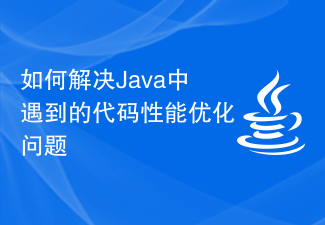How to solve concurrent programming problems encountered in Java
With the development of computer technology and the expansion of application scenarios, multi-threaded programming has become more and more important in software development. As a commonly used programming language, Java also provides powerful support for concurrent programming. However, concurrent programming also brings some challenges, such as data competition, deadlock, livelock and other issues. This article will explore how to solve these concurrent programming problems in Java.
- Data competition
Data competition refers to the problem caused by the uncertainty of the execution order when multiple threads access and modify shared data at the same time. In order to solve the problem of data competition, Java provides a variety of mechanisms and tools:
a. Synchronized code blocks and synchronized methods
Use the synchronized keyword to modify code blocks or methods to ensure that they are executed in the same Only one thread can execute that code block or method at a time, thus avoiding data races.
b. Lock interface
Using the implementation class of Lock interface, such as ReentrantLock, you can manually control thread synchronization and mutual exclusion access. By calling the lock() method to obtain the lock and the unlock() method to release the lock, you can avoid data competition problems.
c. Atomic classes
Java provides a series of atomic classes, such as AtomicInteger, AtomicLong, etc., which provide some atomic operations to ensure that operations on shared variables by multiple threads are atomic. sexual, thereby avoiding data races.
- Deadlock
Deadlock refers to a situation where two or more threads are waiting for each other to release resources, causing the program to be permanently blocked. The following methods can be used to solve the deadlock problem in Java:
a. Avoid circular waiting
By defining a global resource sequence so that each thread requests resources in the same order, it can be avoided A loop waiting situation occurs.
b. Set timeout time
Set a timeout time when applying for resources. After a certain time, if the required resources have not been obtained, the application for the resource will be abandoned to avoid death. Lock problem.
c. Deadlock detection
Java provides some tools to detect the existence of deadlock, such as jstack and jconsole. By regularly detecting the running status of the program, deadlocks can be discovered and resolved in time.
- Livelock
Livelock refers to a situation where a thread continuously changes its state, but cannot continue to execute. In Java, the livelock problem can be solved by the following methods:
a. Introduce randomness
Introduce some randomness when selecting threads for execution through a certain algorithm, thereby avoiding threads Conflicts occur between them, leading to the occurrence of livelock problems.
b. Delayed retry
When encountering a race condition, you can try again after a delay to avoid competition between threads and solve the livelock problem.
c. Collaboration
Through collaboration between threads, some rules are agreed upon to resolve race conditions, thereby avoiding the occurrence of livelock.
- Other concurrent programming issues
In addition to data competition, deadlock and livelock, there are also some other concurrent programming issues, such as performance issues and inter-thread communication issues wait. For these problems, the following methods can be used to solve:
a. Use thread pool
The thread pool can effectively manage and control the creation and destruction of threads, thereby improving the performance of the program.
b. Using concurrent collection classes
Java provides some efficient concurrent collection classes, such as ConcurrentHashMap, CopyOnWriteArrayList, etc., which can efficiently perform data operations in a multi-threaded environment.
c. Use appropriate inter-thread communication mechanism
Java provides a variety of inter-thread communication mechanisms, such as wait(), notify(), notifyAll() methods, etc., which can effectively Perform thread waiting and notification to avoid data competition and deadlock problems.
To sum up, Java provides a series of mechanisms and tools to solve various problems in concurrent programming. By rationally using synchronization mechanisms, locks, atomic classes, etc., as well as avoiding loop waiting, setting timeouts, etc., problems such as data competition, deadlock, and livelock can be effectively solved. In addition, rational use of thread pools, concurrent collection classes, and inter-thread communication mechanisms can also solve other concurrent programming problems. Therefore, when doing Java concurrent programming, developers should fully understand and use these methods and tools correctly to ensure the correctness and efficiency of the program.
The above is the detailed content of How to solve concurrent programming problems encountered in Java. For more information, please follow other related articles on the PHP Chinese website!
 聊聊Node.js中的多进程和多线程Jul 25, 2022 pm 07:45 PM
聊聊Node.js中的多进程和多线程Jul 25, 2022 pm 07:45 PM大家都知道 Node.js 是单线程的,却不知它也提供了多进(线)程模块来加速处理一些特殊任务,本文便带领大家了解下 Node.js 的多进(线)程,希望对大家有所帮助!
 优化Java文件写入多线程性能的方法有哪些Jul 01, 2023 am 10:05 AM
优化Java文件写入多线程性能的方法有哪些Jul 01, 2023 am 10:05 AMJava开发中如何优化文件写入多线程并发性能在大规模数据处理的场景中,文件的读写操作是不可避免的,而且在多线程并发的情况下,如何优化文件的写入性能变得尤为重要。本文将介绍一些在Java开发中优化文件写入多线程并发性能的方法。合理使用缓冲区在文件写入过程中,使用缓冲区可以大大提高写入性能。Java提供了多种缓冲区实现,如ByteBuffer、CharBuffe
 如何优化C++开发中的多线程调度效率Aug 22, 2023 am 09:33 AM
如何优化C++开发中的多线程调度效率Aug 22, 2023 am 09:33 AM在当今的软件开发领域中,多线程编程已经成为了一种常见的开发模式。而在C++开发中,多线程调度的效率优化是开发者需要关注和解决的一个重要问题。本文将围绕如何优化C++开发中的多线程调度效率展开讨论。多线程编程的目的是为了充分利用计算机的多核处理能力,提高程序运行效率和响应速度。然而,在并行执行的同时,多线程之间的竞争条件和互斥操作可能导致线程调度的效率下降。为
 Python服务器编程:利用多线程解决并发问题Jun 19, 2023 am 08:45 AM
Python服务器编程:利用多线程解决并发问题Jun 19, 2023 am 08:45 AM随着互联网的发展,越来越多的应用程序被开发出来,它们需要处理并发请求。例如,Web服务器需要处理多个客户端请求。在处理并发请求时,服务器需要同时处理多个请求。这时候,Python中的多线程技术就可以派上用场了。本文将介绍如何使用Python多线程技术解决并发问题。首先,我们将了解什么是多线程。然后,我们将讨论使用多线程的优点和缺点。最后,我们将演示一个实例,
 如何使用PHP多线程执行多个方法Mar 23, 2023 pm 02:11 PM
如何使用PHP多线程执行多个方法Mar 23, 2023 pm 02:11 PM在PHP开发中,经常会遇到需要同时执行多个操作的情况。想要在一个进程中同时执行多个耗时操作,就需要使用PHP的多线程技术来实现。本文将介绍如何使用PHP多线程执行多个方法,提高程序的并发性能。
 如何解决Java中遇到的代码性能优化问题Jun 29, 2023 am 10:13 AM
如何解决Java中遇到的代码性能优化问题Jun 29, 2023 am 10:13 AM如何解决Java中遇到的代码性能优化问题随着现代软件应用的复杂性和数据量的增加,对于代码性能的需求也变得越来越高。在Java开发中,我们经常会遇到一些性能瓶颈,如何解决这些问题成为了开发者们关注的焦点。本文将介绍一些常见的Java代码性能优化问题,并提供一些解决方案。一、避免过多的对象创建和销毁在Java中,对象的创建和销毁是需要耗费资源的。因此,当一个方法
 Java错误:Java多线程数据共享错误,如何处理和避免Jun 25, 2023 am 11:16 AM
Java错误:Java多线程数据共享错误,如何处理和避免Jun 25, 2023 am 11:16 AM随着社会的发展和科技的进步,计算机程序已经渐渐成为我们生活中不可或缺的一部分。而Java作为一种流行的编程语言,以其可移植性、高效性和面向对象特性等而备受推崇。然而,Java程序开发过程中可能会出现一些错误,如Java多线程数据共享错误,这对于程序员们来说并不陌生。在Java程序中,多线程是非常常见的,开发者通常会使用多线程来优化程序的性能。多线程能够同时处
 刨析swoole开发功能的多线程与多进程调度方式Aug 05, 2023 pm 01:43 PM
刨析swoole开发功能的多线程与多进程调度方式Aug 05, 2023 pm 01:43 PM刨析swoole开发功能的多线程与多进程调度方式随着互联网技术的发展,对服务器性能的要求越来越高。在高并发场景下,传统的单线程模型往往无法满足需求,因此诞生了多线程和多进程调度方式。swoole作为一种高性能的网络通信引擎,提供了多线程和多进程的开发功能,本文将对其进行深入分析和探讨。一、多线程调度方式线程概念介绍线程是操作系统能够进行运算调度的最小单位。在


Hot AI Tools

Undresser.AI Undress
AI-powered app for creating realistic nude photos

AI Clothes Remover
Online AI tool for removing clothes from photos.

Undress AI Tool
Undress images for free

Clothoff.io
AI clothes remover

AI Hentai Generator
Generate AI Hentai for free.

Hot Article

Hot Tools

Dreamweaver Mac version
Visual web development tools

VSCode Windows 64-bit Download
A free and powerful IDE editor launched by Microsoft

MinGW - Minimalist GNU for Windows
This project is in the process of being migrated to osdn.net/projects/mingw, you can continue to follow us there. MinGW: A native Windows port of the GNU Compiler Collection (GCC), freely distributable import libraries and header files for building native Windows applications; includes extensions to the MSVC runtime to support C99 functionality. All MinGW software can run on 64-bit Windows platforms.

PhpStorm Mac version
The latest (2018.2.1) professional PHP integrated development tool

SAP NetWeaver Server Adapter for Eclipse
Integrate Eclipse with SAP NetWeaver application server.






